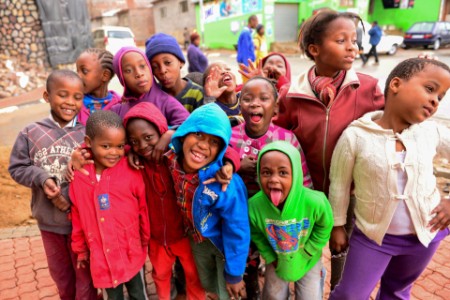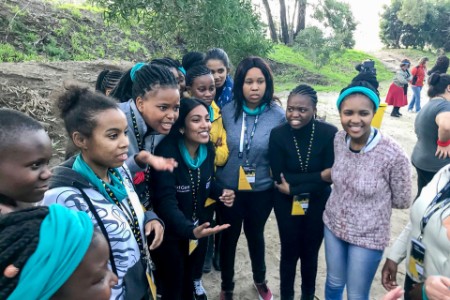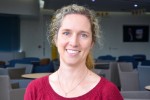
The better question.
Could disadvantage be an advantage?
Mindsets are often best learned through experience.
What skills will young people need most to create, find and sustain meaningful work in a Transformative Age? Agile mindsets and transferable skills — such as initiative and self-reliance, creativity and innovation as well as critical thinking and problem-solving — are an increasingly common answer to that question and it’s easy to see why.
By one popular estimate, 65% of children entering primary education today will end up in careers that don’t yet exist. By another, up to 800m jobs globally could be displaced by automation by 2030. Thriving in a world of unprecedented change and uncertainty will require lots of flexibility and adaptability, not to mention huge reserves of persistence and resilience.
Resilience comes through experience, not by reading a book or listening to a lecture. If you’re a girl from an underserved community, chances are that that experience may be bitter, as a result of struggling with poverty. But what if this adversity actually turned out to be an advantage? What if it was arming you with the very characteristics you’ll need most to adapt and thrive in the future of work?
Related article

The better the answer.
Empowering girls to own their futures
NextGen is nurturing Africa’s next generation of women leaders.
NextGen, the signature initiative of the EY member firm in South Africa (EY), starts from exactly this premise — that girls from underserved communities have talent, grit and determination in abundance. What they lack are opportunities to fulfill their potential.
All girls selected for the initiative are identified as having the potential to achieve academic excellence, the ability to become future leaders and a passion for developing Africa. Through NextGen, they receive holistic support spanning extra academic tutoring, work experience and leadership camps.
These experiences help them develop vital skills, such as critical thinking and creative problem solving, build their confidence and self-esteem, and grant them a greater sense of freedom and empowerment to reflect on who they are and what they want to achieve in life. They can identify their personal leadership styles and strengths and put them into practice, expanding their view of the world and opening their minds to possibilities many of them didn’t know existed.
Related article
The impact of NextGen
100%of NextGen girls have passed their matriculation exam, except for 2018 when the pass rate was 97%.
Without NextGen, I would never have had the opportunity to study at ALA or go overseas. The network EY has exposed me to makes me truly excited about my future.

The better the world works.
Starting a powerful ripple effect
When women and girls are empowered, the effects can be transformational.
Over 230 young women from select disadvantaged schools across Gauteng, KwaZulu-Natal and the Western Cape have been through NextGen since it began in 2012.
The statistics speak for themselves. One hundred percent of participants have passed their matriculation examinations, except for 2018 when the pass rate was 97% and there were 96 distinctions.
But those statistics only tell part of the story. For girls like Lehlabile Davhana, one of the original group of 30 girls enrolled in the program, its effects have been transformational.
Coming from an underserved Johannesburg township, and having lost her mother at an early age, Lehlabile had faced her fair share of hardship. Her achievements in the face of adversity drew her to the attention of the Ministry of Basic Education, which identified her as one of 30 high-potential young women with both the grades and the character to become a future leader.
Through NextGen, Lehlabile was able to attend the Africa Leadership Academy (ALA) on a full academic scholarship. Since graduating, she’s embarked on another new adventure, traveling to Trinity College in Connecticut, USA, to study for a degree in social development.
“Without NextGen, I would never have had the opportunity to study at ALA or go overseas. The network EY has exposed me to makes me truly excited about my future,” she says. “Growing up, I was exposed to young people falling pregnant and dropping out of school, but I’ve learned I don’t have to choose that path. I can push through the barriers of my past and grow.”
Stories like Lehlabile’s are not unique. More than 90% of NextGen girls have gained university entrance passes and have gone on to pursue degrees and careers in fields such as medicine, engineering, accounting, forensics and microbiology. Once they leave university, they’re again connected with EY mentors who help them build their careers.
This too is just the start of an even bigger ripple effect. Consider, for example, that women invest significantly more of their income in their children’s well-being and education as well as in their communities. Consider estimates that women’s equality in the labor force could add US$28t to the global economy. Consider that, when led by a woman, countries achieve an average of 5.4% gross domestic product (GDP) growth in the subsequent year, compared to 1.1% if led by a man.
The evidence is clear. Empower women and girls to become future leaders in business and society, and they become critical catalysts for the sustainable and inclusive growth the world needs.
The team
Contact us
Like what you’ve seen? Get in touch to learn more.


